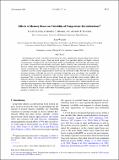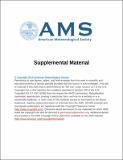Files in this item
Effects of memory biases on variability of temperature reconstructions
Item metadata
| dc.contributor.author | Lücke, Lucie | |
| dc.contributor.author | Hegerl, Gabriele | |
| dc.contributor.author | Schurer, Andrew | |
| dc.contributor.author | Wilson, Rob | |
| dc.date.accessioned | 2020-06-01T23:37:01Z | |
| dc.date.available | 2020-06-01T23:37:01Z | |
| dc.date.issued | 2019-12 | |
| dc.identifier | 263713092 | |
| dc.identifier | b623311a-1d8d-4778-9dad-4a89dc724378 | |
| dc.identifier | 85076260144 | |
| dc.identifier | 000500226400001 | |
| dc.identifier.citation | Lücke , L , Hegerl , G , Schurer , A & Wilson , R 2019 , ' Effects of memory biases on variability of temperature reconstructions ' , Journal of Climate , vol. 32 , no. 24 , pp. 8713-8731 . https://doi.org/10.1175/JCLI-D-19-0184.1 | en |
| dc.identifier.issn | 0894-8755 | |
| dc.identifier.other | RIS: urn:8E76174F47CF7A5638FBCD61737DD2AA | |
| dc.identifier.other | ORCID: /0000-0003-4486-8904/work/65345151 | |
| dc.identifier.uri | https://hdl.handle.net/10023/20030 | |
| dc.description | L.L. was supported by a studentship from the Natural Environment Research Council (NERC) E3 Doctoral training partnership [grant number NE/L002558/1]. A.S. and G.H. were supported by NERC under the Belmont forum, Grant PacMedy [NE/P006752/1]. G.H. was supported by NCAS [R8/H12/83/029]. G.H. was further funded by the Wolfson Foundation and the Royal Society as a Royal Society Wolfson Research Merit Award [WM130060] holder. We acknowledge the National Center for Atmospheric Research (NCAR) for producing and making publicly available their model output. We acknowledge the Northern Hemisphere Tree-Ring Network Development (N-TREND) for providing publicly available data. | en |
| dc.description.abstract | Quantifying past climate variation and attributing its causes improves our understanding of the natural variability of the climate system. Tree-ring based proxies have provided skilfull and highly resolved reconstructions of temperature and hydroclimate of the last Millennium. However, like all proxies, they are subject to uncertainties, arising from varying data quality, coverage and reconstruction methodology. Previous studies have suggested that biological-based memory processes could cause spectral biases in climate reconstructions. This study determines the effects of such biases on reconstructed temperature variability and the resultant implications for detection and attribution studies. We find that introducing persistent memory, reflecting the spectral properties of tree-ring data, can change the variability of pseudo proxy reconstructions compared to the surrogate climate and resolve model-proxy-discrepancies. This is especially the case for proxies based on ring-width data. Such memory inflates the difference between the Medieval Climate Anomaly and the Little Ice Age, and suppresses and extends the cooling in response to volcanic eruptions. When accounting for memory effects climate model data can reproduce long-term cooling after volcanic eruptions as seen in proxy reconstructions. Results of detection and attribution studies show that signals in reconstructions as well as residual unforced variability are consistent with those in climate models when the model fingerprints reflect autoregressive memory as found in tree-rings. | |
| dc.format.extent | 4119735 | |
| dc.format.extent | 1503245 | |
| dc.language.iso | eng | |
| dc.relation.ispartof | Journal of Climate | en |
| dc.subject | GE Environmental Sciences | en |
| dc.subject | NDAS | en |
| dc.subject | SDG 13 - Climate Action | en |
| dc.subject.lcc | GE | en |
| dc.title | Effects of memory biases on variability of temperature reconstructions | en |
| dc.type | Journal article | en |
| dc.contributor.institution | University of St Andrews. School of Earth & Environmental Sciences | en |
| dc.contributor.institution | University of St Andrews. Scottish Oceans Institute | en |
| dc.contributor.institution | University of St Andrews. St Andrews Sustainability Institute | en |
| dc.identifier.doi | https://doi.org/10.1175/JCLI-D-19-0184.1 | |
| dc.description.status | Peer reviewed | en |
| dc.date.embargoedUntil | 2020-06-02 |
This item appears in the following Collection(s)
Items in the St Andrews Research Repository are protected by copyright, with all rights reserved, unless otherwise indicated.


